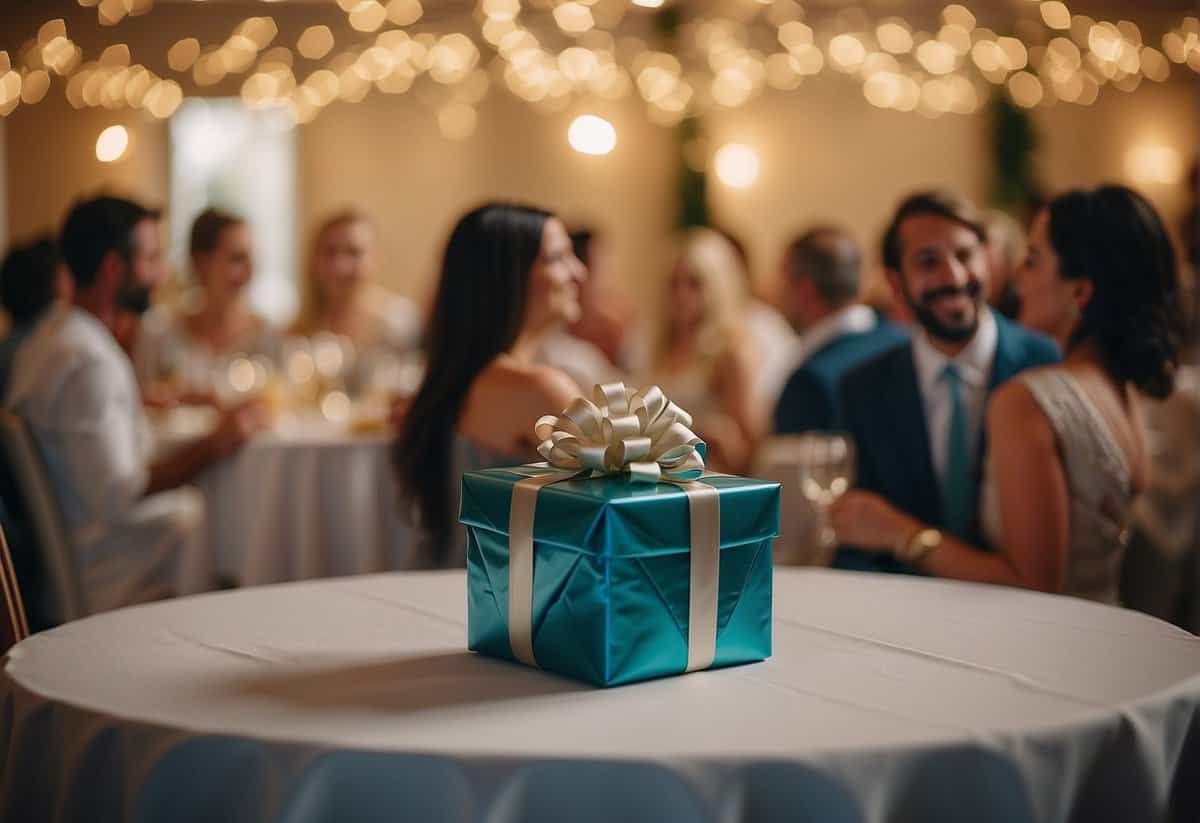Is It Rude Not to Give a Wedding Gift? Understanding Social Etiquette
Wedding invitations often come with the expectation of gifting something to the newlyweds, a gesture that represents your well-wishes and support for their union. However, it’s not uncommon to wonder about the etiquette surrounding wedding gifts, especially if you’re experiencing financial constraints or if you’re not able to attend the wedding in person. Despite traditional expectations, attitudes towards giving are continually evolving, reflecting current social and economic trends.

Understanding the norms and considerations around wedding gift-giving can help you navigate these situations with grace and discernment. While it is generally considered polite to offer a gift, there are scenarios where your attendance or other forms of congratulations are just as significant. It’s important to remember that the value placed on your presence and your relationship with the couple can outweigh material offerings.
Key Takeaways
- It’s customary to consider giving a gift if you receive a wedding invitation.
- Your presence and relationship with the couple can be a meaningful gift itself.
- The appropriateness of giving a gift may depend on various circumstances.
Understanding Wedding Gift Etiquette

Navigating the intricacies of wedding gift etiquette is essential, whether you’re a guest determining what to give or a couple unsure of what to expect.
The Expectation of Giving a Gift
You might wonder if attending a wedding obligates you to give a gift. The short answer is yes; it’s a gesture of goodwill towards the couple’s new life together. According to Brides, even if a gift is delayed, it’s customary for guests to send something to honor the marriage.
Key Points:
- Timeliness: Try to send your gift before the wedding or within three months after the event.
- Presence and Presents: Your attendance does support the couple, but a physical gift is traditionally expected.
Traditional Wedding Etiquette and Modern Trends
Traditional wedding etiquette suggests that your relationship with the couple and your own budget should guide the cost of the gift. The Knot provides a broad guideline — gifts can range between $50 to $200, reflecting your personal budget. However, remember that these figures aren’t hard rules. In fact, changes in social norms and the advent of online registries have shifted expectations slightly. Collaborative gifting, for instance, is a modern solution that follows the rules of traditional wedding etiquette while allowing guests to contribute more substantial gifts together.
Considerations:
- Budget: Align the gift’s cost with what you can afford.
- Relationship Level: Reflect on how close you are to the couple; this often affects gift choices.
- Group Gifting: Participating in a group gift can be both economically feasible and meaningful.
Adapting to modern trends while respecting traditional etiquette ensures your gift is both appreciated and appropriate.
Determining What to Give

When attending a wedding, it’s important to consider both your budget and the couple’s preferences. Whether you’re looking for something from their registry, thinking of giving cash, or seeking a more unique gift, there are several options to suit various budgets and tastes.
Budget Considerations
Your budget is the most practical starting point when selecting a wedding gift. It’s widely acceptable to choose a gift that is within your financial means. Be mindful that it’s not necessary to overspend to show your appreciation. A cash gift can be a straightforward solution; it’s both practical for you and useful for the couple. If cash feels too impersonal, consider a gift card to a store or service you know they like.
Registry Options
Many couples set up a registry, which is a curated list of items they would like as gifts. This takes the guesswork out of deciding what to give because you can select from products they’ve chosen. Online shopping makes it convenient for you to purchase these items, and they’re often shipped directly to the couple. If an item on the registry stretches your budget, look for group gift options where you can contribute with others to a more expensive item.
Creative Alternatives to Traditional Gifts
If you prefer to offer something distinctive, there are many creative alternatives to traditional gifts. Handmade items, personalized decor, or a curated experience can be more memorable than standard gifts. These thoughtful gestures can also align with your budget while providing something special that celebrates the couple’s union. Remember, the sentiment behind a wedding gift often holds more value than its price tag.
Navigating Different Wedding Scenarios

When deciding on wedding gift etiquette, it’s important to consider the type of wedding and your relationship to the couple. Let’s look at how to approach gift-giving in various scenarios.
Destination Weddings
Destination weddings often imply a significant investment of time and money for guests. Your attendance itself is a valuable gift. However, if you feel inclined to give more, a smaller token of appreciation or a gift that acknowledges the couple’s interests can be a thoughtful gesture.
- Factors to Consider:
- Your travel expenses
- The intimacy of the wedding (smaller guests lists often mean you’re a close friend or family member)
- The couple’s preferences for gifts (sometimes they may request no gifts)
Close Family and Friends Versus Coworkers
Gift expectations vary greatly depending on your relationship to the couple. For close family and friends, it’s common to give a more substantial gift or something of sentimental value. For coworkers, a modest gift or group gift with other colleagues can be perfectly appropriate.
- Gift Suggestions:
- Family/Friends: An heirloom or a larger contribution to a big-ticket item on the registry
- Coworkers: A nice bottle of wine or a contribution to a group gift card
Attending Versus Not Attending
If you’re attending the wedding, it’s traditional to provide a gift to celebrate the occasion. If for some reason you can’t attend but you originally planned to, sending a gift is a polite way to show your good wishes.
- RSVP Etiquette: Always RSVP as soon as possible and include a note with your gift, whether you’re attending or not, to make it more personal.
Final Thoughts on Gift-Giving

When you receive a wedding invitation, you might wonder about the etiquette of gift-giving. Remember, celebrating the happy couple on their special day is your main priority. It’s important to consider your relationship with the couple when choosing a gift. Close friends or family might warrant a more substantial gift, while an acquaintance might not expect as much.
- If you have been part of the engagement and lead-up to the wedding, you may feel more inclined to give something that has personal significance.
- Reflect on your own financial situation before making a decision. Your presence at their celebration is a gift in itself.
- It’s not just about the value but the thought behind it. A heartfelt, handmade gift can be just as appreciated as something costly.
Consider these factors:
Personal Budget:
- Evaluate what you can afford—there’s no need to stretch beyond your means.
- A thoughtful card or a small token of love can also convey your best wishes effectively.
Celebration Participation:
- Have you been involved in multiple events (engagement party, bridal shower, etc.)? This could influence your overall gift budget.
In the end, the newly married couple will likely cherish the fact that you shared in their joy more than the price tag of your gift. If your budget allows, giving a gift is a wonderful gesture, but don’t let it overshadow the purpose of the day – to celebrate love and togetherness.
Frequently Asked Questions

When planning or attending a wedding, you may have questions about the etiquette surrounding wedding gifts. Let’s address some common queries.
What should I do if a guest doesn’t bring a gift to my wedding?
If a guest attends your wedding without bringing a gift, it’s gracious to acknowledge their presence as the important part, suggesting sending a thank you card for their attendance may be a considerate gesture.
How common is it for wedding guests to not give a gift?
It is not uncommon for some guests to not bring a gift to a wedding due to various reasons, including financial constraints or cultural differences.
What are some thoughtful alternatives to traditional wedding gifts?
Consider suggesting guests make a charitable donation in your name or offer help with the wedding as meaningful alternatives to traditional gifts.
How can I politely request no physical gifts but rather donations or money for my wedding?
To request donations or money instead of physical gifts, consider adding a note to your invitation or wedding website, expressing your preference in a kind and humble manner.
Is it considered impolite to attend a wedding without bringing a present?
While traditional etiquette often recommends bringing a gift, attending a wedding without one should not be considered impolite, especially if your presence is genuinely appreciated by the couple.
How should I handle the situation where no one brought gifts to my wedding?
In the event that you do not receive gifts at your wedding, it may be helpful to focus on the joy of the occasion and the support of your guests rather than the absence of presents.

